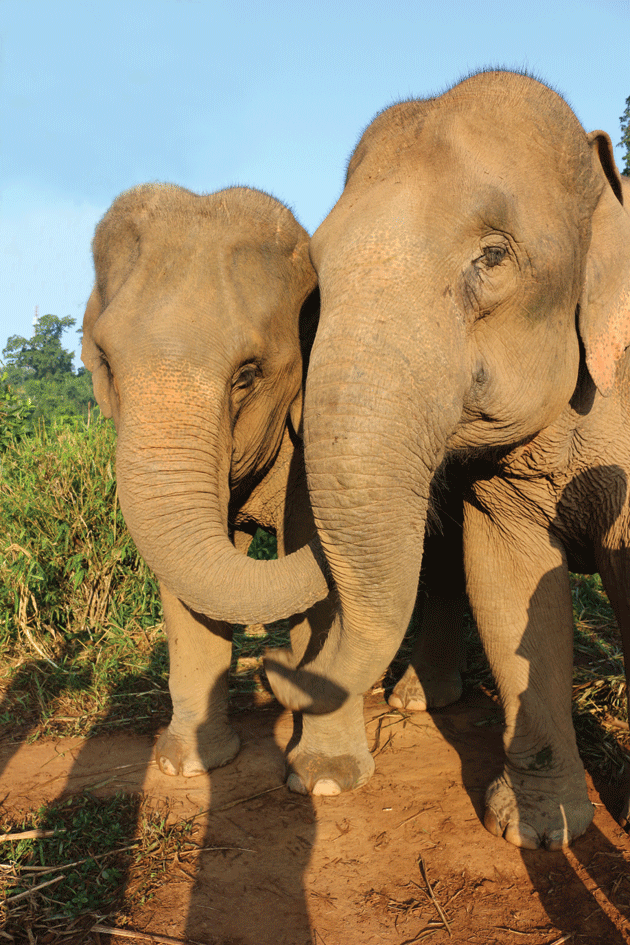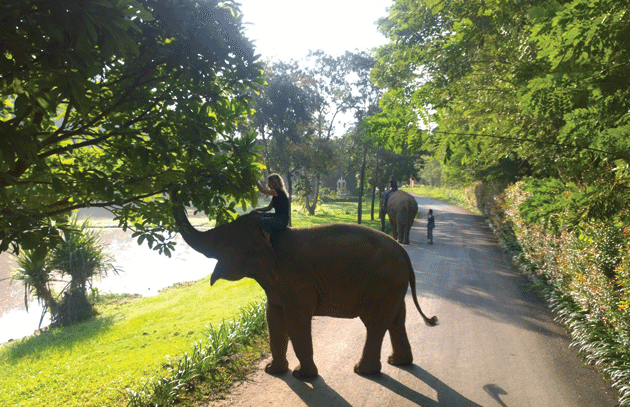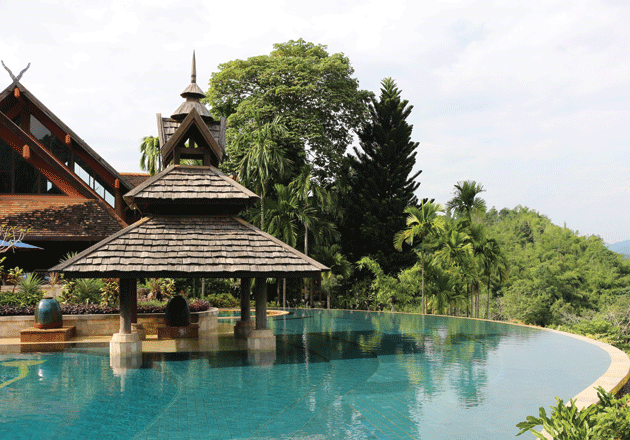Walking With Giants

After experiencing the world high atop an elephant, Vivian Vassos discovers why Thailand truly is the Land of Smiles.
It is said that Buddha could walk at birth. A lotus flower, the symbol of Buddhism, would bloom in his wake. With every step forward, there was life.
My wake is a different matter all together, particularly from the back of an elephant. With every step forward, my animal friend Bo swings her trunk, inspecting the bamboo grasses and anything edible she can tear up and then cram into her mouth, as we trek on. Lotus flowers, no doubt, would tremble in her wake. At 36, she’s like a precocious child; she’s easily distracted, especially by all the accessible leafy greens that surround her home at Anantara Golden Triangle Elephant Camp and Resort. We’re in the jungle of Chiang Rai, near the Northern Thailand border, and all of Bo’s favourite foods are within her reach.
In Thailand, the elephant has long been respected as a domestic helper. Strength and amiability, a trait the Thai people and elephants seem to share, allow man and animal to partner for the task of logging and hauling, in the building of homes and villages.

But since the advent of better technology and heavy machinery, the elephant is no longer needed in many areas of the country. Some were abandoned, left to fend for themselves in the wild, a place in which they were unfamiliar, while others have been adopted into elephant camps, where they can live and be cared for by their elephant handlers called mahouts. Some have been with the same mahout for years, a member of the family.
“Pai! Pai!” I’m sitting atop Bo’s neck, with my knees and feet tucked in neatly behind her ears. The word I’m shouting loosely translate to “Go,” sort of like telling your dogsled team to mush. And, as when riding a horse, your legs do a lot of the steering.

A gentle nudge with my toes behind her ears helps Bo get the message. Squeezing my knees together and the command of “How!” helps to slow her down to a stop. She’s hot and sweaty, so we’re going for a bath before I feed her a light lunch of the bamboo stalks she like to eat—over the three hours we’re together, she’s constantly reaching back with her curling trunk, searching my lap for treats, a gentle touch and not threatening in any way.
“The beauty is that their existence is covered by the hotel,” says John Roberts, director of elephants and conservation activities at the resort, “and then the awareness is heighened for our [rescue efforts through the] Golden Triangle Asian Elephant Foundation, which is most important.”
Bo, an orphan, is spoiled by her uncle and nephew team of mahouts – it’s obvious they adore her, as cheeky as she is, when one of them leads her to her bath and jumps in with her and then scrubs her behind the ears. His smile is as joyous as her splashing.
Handling our group of travellers is Daniel Fraser of the tour company Smiling Albino.
The Calgary-raised Fraser has spent much of his adult life in Thailand, where the Asian headquarters of his company has resided since 1999. He’s passionate about sharing this part of the world.

“This is deeper than bucket list,” he says, when we talk about life-changing experiences through travel, such as learning to ride and care for an elephant.
“This is what I call milestone travel. A celebration, hitting a milestone birthday, anniversary, a promotion, and going more in-depth into a culture and its people.”
It’s not all about high-end luxury with Smiling Albino; sure, there’s the Anantara and also private villas – Pa Sak Tong in Chiang Rai, for example, is where one season of The Bachelor was filmed – but there are also plenty of grassroots hotels and experiences in which one can immerse oneself, allowing for every budget and fitness level.
A typical eight-day trip, says Fraser, could have multi-activity adventures. “It’s luxury-meets-street- level experiences.”
Guests are invited to take tea with locals in an established Oolong-producing area in the northern part of the country, or they can watch Shan artists weave traditional patterns into beautiful silk scarves and table linens.
And, after a bike ride or a hike through the countryside, dinner can be at a typical home on stilts, hosted by the local hill tribes – the Akha and Lahu people.
In one such home, I encountered a beautiful older woman, resplendent in her traditional dress. When I told her how beautiful she was, she covered her mouth and smiled shyly. She didn’t want me to see her lack of teeth. Yet, the smile was there, like her country’s nickname – it turns out the Thai language has 13 words that could be used for “smile.”
Everyone has their own interpretation of why Thailand is called Land of Smiles, but I chalk it up to Buddhism and the belief of living in the moment, being happy in that moment.
And at this moment, I managed to convince her, through body language and smiles of my own, that she was beautiful nonetheless, and she posed regally for my camera, as did our hosts. They may have been pouring tea in not much more than a mud-floored three-room hut, but the pride of place showed on their faces. All were smiling, laughing, admiring their images on my camera’s playback screen.
Getting up-close-and-personal with elephants was, for me, definitely bucket list. But, then, I had my own milestone moment, this one, where language and tradition might have posed a barrier, but that barrier was stripped away. With a smile.
If You Go
Smiling Albino has a variety of Asian itineraries, including Thailand, and can also plan bespoke trips (motorcycles through the mountains; mornings with the monks). 1-403- 668-9455 (Calgary).
For more on the AnantaraElephantprogram, go to www. helpingelephants.org.